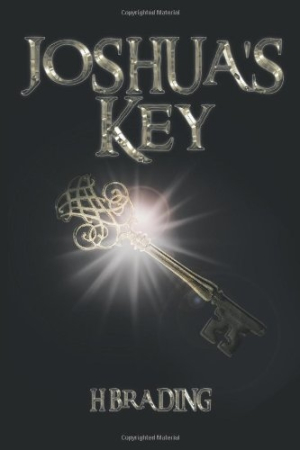Joshua's Key
H. Brading’s epic novel Joshua’s Key begins in the humble fishing village of Seaton, where Joshua and his father, Raymond, find themselves entangled in an adventure they’d have preferred to avoid. Kidnapped by Queen Amega of the Hen Coed women warrior tribe, young Joshua is persuaded to seek the Key of Life. He joins forces with wizards, owls, foxes, and the highly trained soldiers of Stone Mountain in order to prevent the total fall of his world to Darkness.
The realm descriptions in Brading’s novel are creative and filled with sound, color, and detail. Since this is a journey tale, the reader is immersed in such settings as Morfa, the underwater cavern where the ancient elders of Seaton study scrolls and wait for visions, or the lush Garden of Eden, where the tree of light powers a dome that protects its inhabitants from evil. The author’s playful infusion of Welsh lends a mystical air to her inventions, such as “sheetrea,” a tea that calms the nerves, “seaorcai,” a substance that allows humans to breathe underwater, and “prydferddwch yr goedwig,” beauty of the forest—an herb that produces bubbles of light.
Although the story begins and ends with Joshua and his quest, many groups find themselves in a parallel fight to save their world from Darkness. Sorn, Raymond’s oldest friend, leads his village to safety before being murdered by the traitorous coward Zoba, who also assassinates two of Queen Amega’s bodyguards. Minor adventures include the escapades of Lady Isabella and her friends, as well as King Aaronus of the Stone Mountain, who sends his village to hide in a cave guarded by the ancient rock-man, Igneous, while Aaronus takes his army to fight the Darkness. Plus, there’s Spindle, the wizard who leads his band of magicians to the Garden of Eden, where they encounter Sinoue, the apprentice who talks to plants and helps them grow. Like pieces in a well-designed puzzle, each group meets up at the final destination to fight the malicious warlock Kessian and his band of zombie-like creatures and vicious wolves.
Despite the epic scenery and fast-paced action, it is often difficult to tell whose story this is, since the author switches points of view frequently. For example, it might be Joshua’s chapter, but the author tells the thoughts of other characters by using a loose omniscient style instead of the more appropriate limited third-person point of view. This careless switching makes it difficult to pick a hero to cheer for. Also, cutting the cast of characters (there’s more than one hundred) in half would help eliminate some of the confusion.
Brading’s dialogue is often stiff and overly formal. Spelling and punctuation errors, overly long paragraphs, and run-on sentences are also distracting. Readers who can’t complete this six-hundred-page novel in one sitting will want to use a bookmark—there are no chapter names or numbers, as well as no table of contents.
Still, with Welsh overlays, a complex plot that splices together neatly in the end, and adventures that hearken to Eragon and The Lord of the Rings, Brading’s novel is a fine effort offering glorious endings for the good guys.
Reviewed by
Emily Asad
Disclosure: This article is not an endorsement, but a review. The publisher of this book provided free copies of the book and paid a small fee to have their book reviewed by a professional reviewer. Foreword Reviews and Clarion Reviews make no guarantee that the publisher will receive a positive review. Foreword Magazine, Inc. is disclosing this in accordance with the Federal Trade Commission’s 16 CFR, Part 255.

